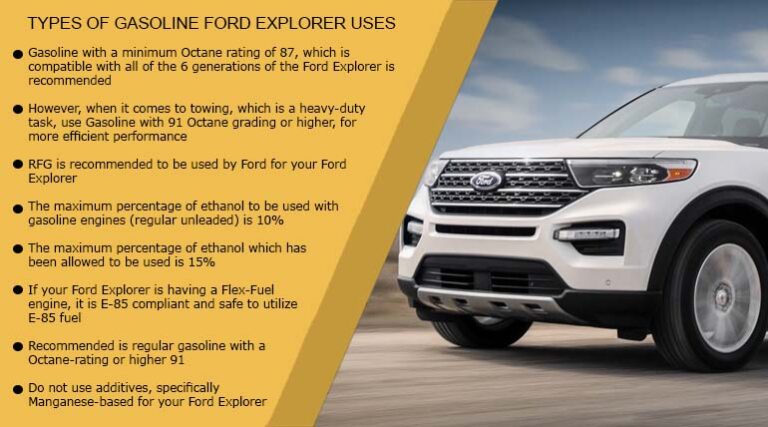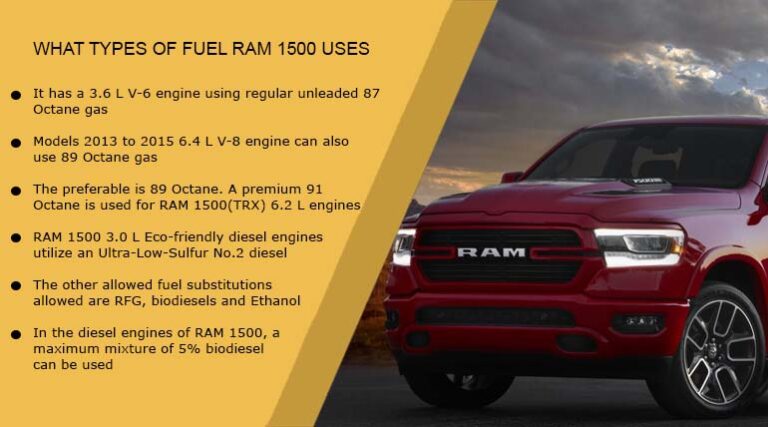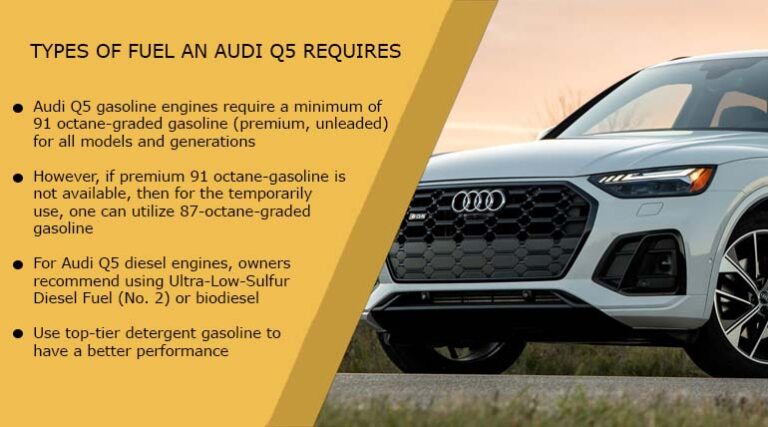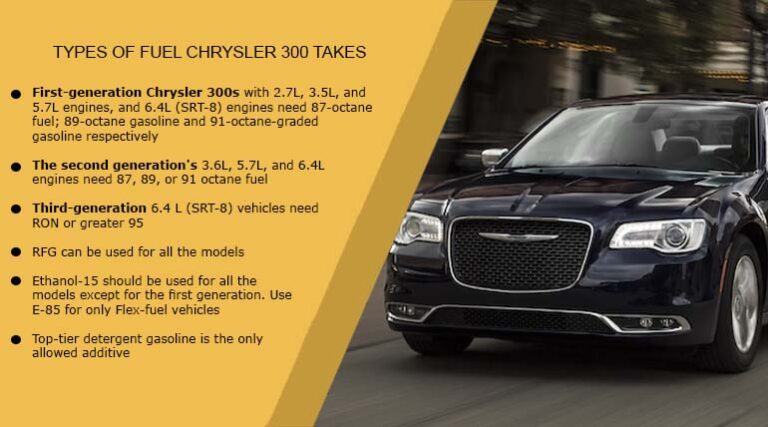Which Types of Gasoline Audi Q3 Uses? Regular or Premium?
The Audi Q3 is a favorite among Audi drivers and owners of high-end vehicles, because it is a little SUV that nonetheless packs a punch. Moreover, it made its debut in that year. Knowing what kind of gas it takes is crucial to keep the car running smoothly and at peak performance. Here, we’ll discuss the types of gasoline Audi Q3 uses, so you can decide what to put in your car for optimal performance.
An Overview
Finally, premium unleaded gasoline with an octane level of 91 is highly suggested for all Audi Q3 models. In the event that premium fuel is temporarily unavailable, standard 87-octane gasoline may be used as an alternative.
Types of Gasoline Audi Q3 Uses Explained
Following are the types of gasoline Audi Q3 uses for optimal performance. Let’s explore together, shall we?
The Audi Q3 – Model Years 2018 to Present
The only available Audi Q3 engine for the latest generation is a 2.0-liter variant. The owner’s handbook for the Audi Q3 endorses using gasoline with as lowest as Octane-grading of 87. Although Audi recommends the Octane number 87, we get the impression they need to be confident it is the best option. Confidence is lacking if one is able to use phrases like “However, this does decrease the engine’s power substantially.”
We advise drivers to use fuel with an octane rating of 91 or above as a bare minimum. This will eliminate Audi’s concerns about “decreased engine’s efficiency.” Using fuel with a higher-octane rating also prolongs the life of your engine.
| Engine (2018 to Present) | Compatible Fuel |
| 2.0 L (4 cylinder) | Minimum 87, preferable 89 or 91 Octane-graded gasoline |
The Audi Q3 – Model Years 2015 to 2018
The first model, like the second, was offered with a 2.0 L engine in two distinct power levels. The 1st generation (2015 to 2018) Audi Q3 was compatible with fuels with an acceptable octane rating of 87, according to the owner’s manuals. Warnings were sent about the potential loss of performance while operating on gasoline with an octane rating of 87. The handbook also proposes using 91-octane or higher gasoline, per Audi’s recommendation.
| Engine (2015 to 2018) | Compatible Fuel |
| 2.0 L (4 cylinder) | Minimum 87, preferable 89 or 91 Octane-graded gasoline |
Regular Unleaded Gasoline – The Preferred Choice
Audi Q3s, like most current automobiles, are designed to run on standard unleaded fuel. Whether you call it “Regular” or “87-octane,” you can get this fuel at gas stations all around the United States and the rest of the globe. It provides an ideal compromise between fuel economy and performance, making it the go-to option for everyday usage of the Q3.

Credits @audifreehold.com
The advanced engines in the Audi Q3 just need regular unleaded gasoline, which provides enough energy to ignite the air-fuel combination inside the engine cylinders. It’s an excellent choice for motorists since it strikes an amazing blend between value and performance. This, however, is really a stopgap measure. Audi endorses using a premium 91-octane fuel, or at least 89-octane gasoline.
Non-Conventional Fuel Types for Audi Q3
Using a variety of different fuels in your Audi Q3 may improve its efficiency. In this part, you will learn about several other alternative fuels that may be utilized to improve your vehicle’s engine performance;
Reformulated Gasoline Fuel (RFG)
Reformulated Gasoline Fuel (RFG) is the most incredible alternative for those who want to reduce their impact on the environment. Therefore, RFGs would replace regular gasoline in all Audi Q3 engines.
Do You Know?
Other models of Audi such as Audi A3 and Audi Q5 also utilize similar types of fuels to perform optimally.
Oxygenated Blends of Gasoline
The E-30 and E-50 are incompatible with all Audi Q3s. It will only function with gasoline that has 15% ethanol. The legal limit for ethanol content is 15%. Ethanol-85 is used only for flex-fuel vehicles.
Gasoline with Additives
The Audi Q3 has strict requirements for fuel. High-end, premium detergent gas is your only option, given that the single legal component is analogous to a cleaning solution. Conscripted are the proscribed additives;
· Solvents
· Methanol
· Any metal-based ones
· Kerosene
· Additives based on metals
· Manganese-based combinations
· Lead-based fuels
Methylcyclopentadienyl Manganese Tricarbonyl (MMT) Based Gasoline
Audi claims that the Q3’s gas should be MMT (Methylcyclopentadienyl Manganese Tricarbonyl) free for the reason that doing so might seriously damage the car’s ability to prevent pollution.
The Leaded Fuel (Gasoline)
If you own an Audi Q3, you should avoid using leaded fuel. Using leaded gasoline may damage your car’s 3-way catalytic converters and cause problems with the vehicle’s emission control system.
Biodiesel
All Audi Q3 models can only operate on standard unleaded gasoline, not the more expensive biodiesel blends. The Audi Q3 does not run on biodiesels or any other diesel-based fuel, according to the company. Read more about the differences between diesel and gasoline-based engines.
Manufacturer’s Recommendations
It must be emphasized that Audi, like other automakers, recommends a particular grade of gasoline for use in their cars. The optimum performance of the engine with minimal loss of fuel economy is guaranteed by following these guidelines, which are based on considerable study, engine design, and testing. Premium 91-octane or higher-graded gasoline, or at least 89 Octane-rated gasoline, is suggested for use in an Audi Q3.
Regular unleaded fuel should work OK in your Audi Q3 but check your owner’s manual just to be safe. Manufacturer recommendations may change as vehicle technology, and engine specifications evolve over time.
Potential Consequences of Incorrect Fuel Usage
Your Audi Q3’s health, economy, and performance might suffer if you use the wrong kind of gas. Using gas with a lower octane grade than suggested might result in knocking or pinging in the engine, which can cause prolog harm.
However, there is no assurance that consuming a higher octane gasoline than is advised would improve performance or gas mileage. Because of its intended use in high-performance engines with high compression ratios, high-octane gasoline may not provide any noticeable benefits when used in a standard engine.
Following the manufacturer’s rules for fuel’s type and octane-rating will keep your Audi Q3 running smoothly and efficiently.
Maintaining Optimal Performance
If you want your Audi Q3 to last as long as possible and function at its best, regular maintenance is just as essential as using the correct fuel. Maintaining your Audi with frequent oil changes, scheduled maintenance, and inspections at authorized service providers will ensure its optimal performance.
Keep an account of the way you usually drive, and the weather. If you often drive long distances or live in a high-altitude location, you may need to change your fueling and maintenance schedules. Audi service experts are a wealth of knowledge and may provide advice suited to your needs as a driver.
Conclusion
In conclusion, the Audi Q3 can run on ordinary unleaded fuel, sometimes known as “Regular” or “87-octane.” If you care about your Audi’s performance, fuel economy, and engine health, you should use just the amount of gasoline that the manufacturer suggests. Audi recommends using a premium 91-octane fuel, or at least 89-octane gasoline.
Your Audi Q3 will continue to provide the thrilling performance and plush comfort, as long as you undertake routine maintenance and adhere to safe driving practices. If you maintain your Audi and fill it up with the correct fuel, you will have many pleasurable years behind the wheel.






